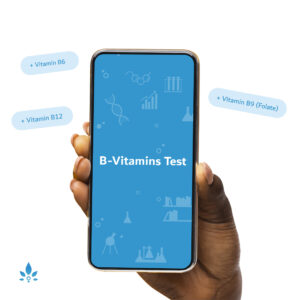Are you Getting Your B Vitamins?


Known as ‘energy vitamins’, it’s no secret B vitamins are necessary for the healthy functioning of our bodies. Releasing these essential nutrients into our bodies with smart food choices is key to optimal wellbeing.
Our bodies need 13 vitamins to grow and work the way they should. Eight of these vitamins are the water-soluble B complex vitamins, essential for metabolic processes converting food to energy, cell growth and function, and making red blood cells.
B vitamins are also linked with fetal brain development and reducing the risk of birth defects, playing a vitally important role in women who are pregnant or breastfeeding.
With the exception of vitamins B12 and B9, which can be stored in the liver, B vitamins cannot be stored in your body and must be consumed regularly in your diet. As B vitamins are present in varying quantities in most unprocessed foods you should have no problem getting the daily vitamins your body requires with a balanced, nutritious diet. You can get a B Vitamins test to check your levels.
Why you need B vitamins and which foods are high in vitamin B
Each B vitamin performs an essential and complementary job in keeping our bodies running smoothly.
Vitamin B1, Thiamin helps keep the nervous system healthy and assists in the breakdown and release of energy from the food we consume.
Good sources of thiamin include whole grains, fortified breakfast cereals, liver, nuts and seeds, legumes, and some fresh fruits.
Vitamin B2, Riboflavin aids in energy production and vision and skin health.
You can find riboflavin in dairy products, eggs, leafy greens, whole grains and fortified breakfast cereals, and mushrooms.
Vitamin B3, Niacin has been linked with reducing LDL ‘bad’ cholesterol and triglyceride and increasing HDL ‘good’ cholesterol levels. It also helps improve blood circulation.
Niacin is present in proteins, meat, fish, dairy products, whole grains and fortified breakfast cereals, and mushrooms.
Vitamin B5, Pantothenic acid is needed to metabolize carbohydrates, fats, proteins, and alcohol. It also helps to make red blood cells.
Sources of vitamin B5 include meats, dairy products, eggs, liver, kidneys, wholegrain foods, nuts and legumes.
Vitamin B6, Pyridoxine plays an important role in metabolising protein and carbohydrates. It also assists in the formation of haemoglobin, responsible for transporting oxygen around the body, influences brain function and supports the immune system.
Foods high in vitamin B6 include meat and poultry, fish, leafy greens, legumes, nuts, whole grains and some fortified breakfast cereals.
Vitamin B7, Biotin is needed in small amounts to help the body make fatty acids.
Biotin is present in many food sources including poultry, eggs, liver, mushrooms and nuts.
Vitamin B9, Folate (or folic acid when included in supplements) is important in red blood cell formation and healthy cell growth and function. Also important for the developing fetus during pregnancy, folate or its synthetic form folic acid, helps prevent anemia in pregnancy and reduces the risk of neural tube defects, such as spina bifida.
Foods rich in folate include broccoli, leafy greens, fortified breakfast cereals, some fruits and juices, liver (must be avoided when pregnant), nuts, peas, chickpeas and kidney beans.
Vitamin B12, Cobalamin plays an essential role in red blood cell formation, the metabolism of every cell in our bodies and nerve function.
Good sources of vitamin B12 are meat and poultry, dairy products, eggs, liver, fortified breakfast cereals and other fortified foods. It’s worth noting that if you follow a vegetarian or vegan diet you are at risk of vitamin B12 deficiency and should consider supplements.
How do I know if I’m vitamin B deficient?
Symptoms of vitamin B complex deficiency can be both mental and physical and differ according to the vitamin B deficiency. They range from tiredness, fatigue, and depression to loss of appetite, muscle weakness and numbness or tingling in your hands and feet.
In general, a varied, well-balanced diet should provide the daily B vitamins your body needs. If you choose to take supplements remember to follow the recommended daily limit guidelines as taking too much of some vitamins can be harmful.
If you think you might be vitamin B deficient speak to your doctor who will discuss your symptoms with you and may run blood tests. Alternatively, personalised healthcare platform Nabta Health offers convenient at-home testing of vitamins B6, B9 and B12.
Sources
Symptoms of Vitamin B Deficiencies, Healthline
https://www.healthline.com/health/symptoms-of-vitamin-b-deficiency
Getting your vitamins and minerals through diet, Harvard Medical School, October 13, 2020
https://www.health.harvard.edu/womens-health/getting-your-vitamins-and-minerals-through-diet











































